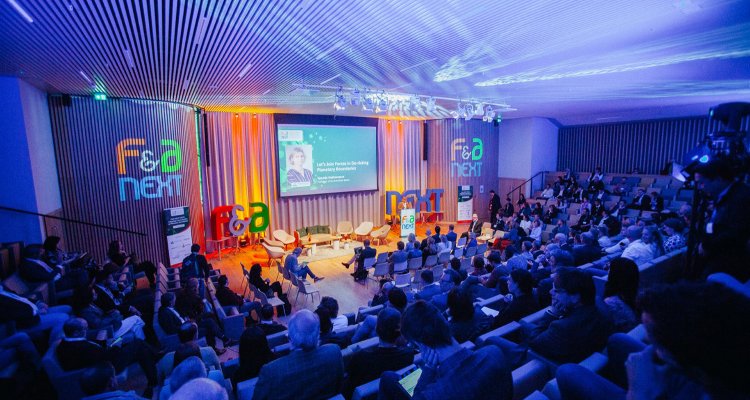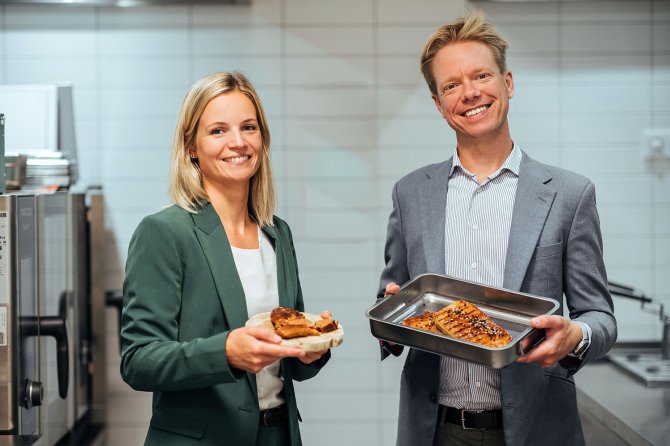
News
WUR spin-offs at F&A Next: Scope Biosciences and Rival Foods
During F&A Next 2024 on 22 and 23 May, startups in the agri-food sector will have the opportunity to present themselves to potential investors or strategic partners. WUR spin-offs Scope Biosciences and Rival Foods will be on the podium. Five years after their establishment, how are both companies doing?
Foods makes plant-based meat alternatives in Amersfoort and a production location in Geldrop in the province of Brabant. However, what both companies have in common is that they started in 2019 as a spin-off from Wageningen University & Research. Over the past two years, they have been awarded millions in investments to further grow their business. What challenges do they face in scaling up their production?
For both companies, we start by discussing how it all began. For Niek Savelkoul from Scope Biosciences, this was when he and professor of microbiology John van der Oost applied a new CRISPR-Cas technology for the on-site detection of pathogens in agrifood and health care. With Intellectual Property - developed with WUR - he then acquired funds to set up a laboratory and recruit staff. The product name was scopeDx.
F&A Next: Next Heroes in Food & Agtech 2024
At the F&A Next conference on May 22 and 23, start-ups in the agrifood sector will present themselves during the Next Heroes in Food & Agtech 2024 session. Among other activities, there will be a short Q&A with a panel of investors.
Scaling up in small lab
Scope Biosciences has a laboratory which they found at startup incubator Plus Ultra I. ‘We specialise in making reagents, in other words test tubes with liquid,’ Savekoul explains. ‘You can use them in handy devices, for a plant breeder in a growing location, for example. Or in large equipment in a hospital. We make all those reagents ourselves, but not the equipment. For now, that means we still have space to scale up.’
Moving from a lab in a university to a site of its own did prove a challenge. Savekoul: ‘You think you can get going almost immediately but it takes a long time until you have everything you need and the lab is operating. It’s all about pioneering and keeping going until everything works.’ Since then, he and a team of currently around ten staff have been focusing on an increasingly wider range of tests. ‘Whether you’re making a test for COVID or for a tomato virus, the process is 99 percent the same. That makes a huge difference when scaling up.’
Products and building machines
Rival Foods’ chicken breasts have already landed on the first gourmet plates. However, this was preceded by quite a journey. It started with Birgit Dekkers’ PhD research at WUR in which she developed new technology to make meat alternatives. ‘None of those unhealthy vegetarian hamburgers, but a plant-based beef steak or tuna steak that mimics the structure of muscle tissue. They are also much healthier, containing minimum salt and fat.’

Initially, Rival Foods was based on Wageningen Campus. They even shared an office for a while with Scope Biosciences. Dekkers: ‘We soon needed more room, because we develop both the products and the machines to make them.’ Thanks to investments, Rival Foods was able to move into a building in Amersfoort and the company recently started converting an old meat factory for large-scale production. ‘This is where we’re going to make between 100 and 400 tons of meat alternatives every year,’ Dekkers expects.
Tasting is believing
The products will go first to restaurants, later to supermarkets. According to Dekkers, a challenge will be selling something totally new: a plant-based muscle product. ‘Many consumers want to eat more plant-based products but are not satisfied with the structure or flavour of existing meat alternatives. Another factor is how healthy the product is. People are therefore initially sceptical, something I also notice in conversations with restaurants. But once they’ve tasted them, they’re converted. And cooks are enthusiastic because they can be much more creative with it than with a standard meat replacement.’
Working with researchers
Both companies work together with researchers. Savekoul uses the new knowledge that emerges from that collaboration for validation and for more fundamental knowledge. ‘At WUR, there is an incredible amount of knowledge about CRISPR-Cas, and pathogens in agrifood. So, we continue to work together with various sciences groups at WUR.’ Eventually, he wants to further expand the number of applications in diagnostics.
Dekkers also maintains contacts with WUR to further develop the products and machines of Rival Foods. Moreover, along with researchers and suppliers, she is looking for plant-based proteins from Europe to minimise the distance travelled by the soy used by the company. ‘Broad beans don’t go well with a chicken product due to the aftertaste, but I expect this will change.’
For Scope Biosciences and Rival Foods, F&A Next is a place to share experiences and extend their network. During the event, visitors can also sample a piece of plant-based chicken.